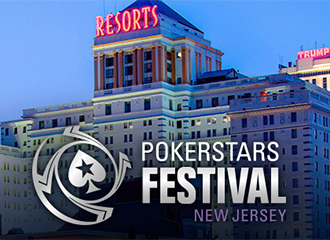
Even though it was delayed in its entrance to the online gaming and poker market in New Jersey, it was expected that PokerStars, the by-far #1 online poker site in the industry internationally, would waltz in and dominate the Garden State market. While they are leading the Jersey industry, it isn’t by a dominant margin and, when it comes to the live game, PokerStars is arguably failing.
The New Jersey online gaming market went live in November 2013, at which point PokerStars was being held up by the New Jersey Division of Gaming Enforcement. The holdup was due to the continued involvement of PokerStars’ founder Isai Scheinberg with the company while he was under indictment by the federal government (a case in which he is the only person left at large). Only after the Scheinberg Family sold the company to Amaya Gaming in 2014 was there an effort to get the PokerStars brand into the Jersey market.
In 2015, the NJDGE gave its blessing for PokerStars to enter the online gaming/poker market in the state and, by October, the site moved forward with its partner in Resorts AC. Upon its introduction, PokerStars roared ahead of the other two, more established outlets in partypoker (and its partner in the Borgata) and 888 Holdings (paired with Caesars and Harrah’s). But those numbers have balanced out two years since PokerStars’ introduction.
PokerScout, the highly respected online poker industry ratings outlet, currently has PokerStars/Resorts AC as the highest ranked online poker outlet in the state, but it isn’t by a wide margin. PokerStars/Resorts has a seven-day average of cash game traffic (the industry standard) of 80 players. This holds the edge over Party Borgata (70 players) and WSOP/888 (60 players) and, with the extensive potential for duplication from players who play on all the sites, the numbers may be even closer than what the rankings say.
This lead also could very well be a tenuous one. With the recent compact between New Jersey, Nevada, and Delaware, only WSOP/888 is licensed in all three states (a regulation for pooling the players between the trio of states). Logically most players, seeking more action and bigger player and prize pools, will migrate to the WSOP/888 offerings in New Jersey, leaving PokerStars and Party Borgata (neither is licensed in Nevada or Delaware) out in the cold and probably losing players.
While it shouldn’t have an effect, PokerStars’ live poker efforts in New Jersey have been less than exciting. PokerStars put on a two-event series earlier this month, with a $200 buy in tournament (with four starting days) and a $100,000 guarantee and a $100 buy in event with a $25,000 guarantee. Whether it wasn’t promoted well, didn’t have tremendous support for satellites or their online arm didn’t come through, players didn’t exactly flock to the live felt with the PokerStars brand on it.
The $25,000 event pulled in only 119 entries, putting PokerStars and Resorts AC on the hook for a $13,100 overlay and the Main Event wasn’t much better. With a $100,000 guarantee on the line, that tournament (with four starting flights, mind you) could only bring in 409 entries, forcing PokerStars and Resorts AC to put out another $18,000 to make the prize pool whole. Doing the math, that means that, for two tournaments with $125,000 in guarantees, more than $31,000 – almost a quarter of the prize pools guaranteed – were overlays.
This wasn’t an isolated occurrence, either. In 2016, PokerStars and Resorts AC held a true PokerStars Festival event that, despite all efforts, only drew 208 players for its Main Event. Other preliminary tournaments on the schedule were populated by double figure crowds, tremendously disappointing for the online site as it was making its mark in Atlantic City. In fact, the reduced number of tournaments in 2017 were more than likely a direct result of the lack of player participation the previous year.
The problems for PokerStars and Resorts AC could be something as simple as being the ‘new kid on the block.’ For the Borgata, there was assistance from the World Poker Tour (which moved its World Championship event to its grounds for a couple of years) to help buoy its work in online poker and its satellites. Caesars and Harrah’s had the same advantage with the WSOP label on their online offerings. For PokerStars and Resorts AC, there isn’t that gravitas that the others have.
Whether there will be improvement in the future for live efforts from PokerStars and Resorts AC – or even if they’ll keep trying – is something that remains to be seen. But it is evident that PokerStars hasn’t been the overly dominating force on New Jersey that everyone assumed it would be.















